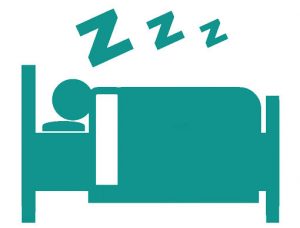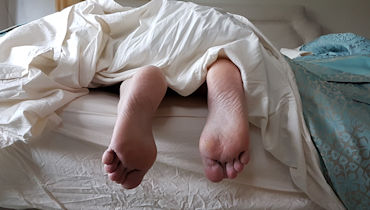COVID-19 has changed the way we all live, and that may have affected your sleeping patterns.
Sleep is important for muscle repair, memory consolidation, growth, and a healthy immune system.
Adults need between seven and nine hours of sleep a night. Here are some tips which may help if you’re finding that difficult.
Help your body clock:
- Go to bed and wake up at the same time each day (even weekends), and stick to a regular pattern of meals.
- Try to get some daylight in the mornings.
- Avoid looking at TV or your phone in the evenings. The blue light is thought to tell your brain that it should be waking up.
Your bedroom
- Keep your room cool (between 16 and 18 degrees C), dark, and quiet. If necessary, use an eye mask and earplugs.
- Make sure your bed is comfortable.
- Try to keep your bedroom for sleep only, so your brain associates it with sleep. If you can’t use another room for computers, phones or TV, keep them separate from the bed, and clear everything away at the end of the day.
 If you suffer from insomnia (regular problems sleeping), good sleep hygiene can help:
If you suffer from insomnia (regular problems sleeping), good sleep hygiene can help:
- Get some exercise during the day – although don’t do too much exercise close to bedtime.
- Cut down on caffeine, especially after midday, and limit your alcohol intake. Nicotine is a stimulant: avoid smoking near bedtime. Also, don’t eat too much near bedtime.
- It can help to have a wind-down routine at the end of the day. Listening to quiet music, reading a book, or doing yoga may help you to relax.
- Don’t lie in bed worrying. Instead, get up and make a list of what you will do the next day. Do something else for a bit, and then go back to bed when you feel sleepy again.
Download our toolbox talk: sleep awareness and fatigue (102kb pdf)
More information
There is more information on the NHS website including some apps which can help. The NHS Every Mind Matters website also has lots of good sleep advice.
You can also listen to the NHS audio guide by Dr Chris Williams which has more information and advice.
There is an informative pdf you can download from Duradiamond (also known as Health Partners).
The NHS-recommended ‘Sleepio’ online course is free to people who live in Oxfordshire, Buckinghamshire and Berkshire.
